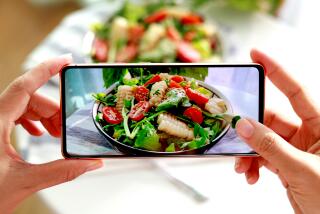Cravings--the Body’s Way of Sending a Warning
- Share via
NEW YORK — You know the feeling: Your diet starts out just fine. But after a while--a day or a week or a month--the urge begins to build for chocolate, or taco chips, or a burger.
And then, nothing else will do. Perhaps you walked by a bakery and spied that chocolate cream pastry was in the window. Perhaps it was the smell of beef on the grill. It’s also possible your diet is too strict, and your body is trying to tell you it needs more food.
There is a theory that your body is smart enough to crave what it needs; another gives more weight to psychological causes of cravings.
In any case, they can sabotage even the most reasonable diet. Some experts say go ahead and give in to a craving, so you won’t eventually binge.
Dr. Susan Schiffman, director of the weight loss unit at Duke Medical Center in North Carolina, said people learn to associate the tastes and smells of foods with what they do for us.
If you are deficient in a particular nutrient, you may crave foods that contain it, she said. Or if you need calories, you are likely to crave high-calorie foods.
This, of course, makes dieting difficult, particularly after a season of indulgence in cookies, eggnog, alcohol and other sweet and fatty foods.
Schiffman recommends dieters make a list of the tastes, smells and textures they crave, and try to replicate them in foods with fewer calories. For example, if the desired sensation is crunch, try pretzels rather than potato chips.
Another approach is to stop dieting, eat better, and give in to the occasional craving.
“The body doesn’t like this stupid idea of you starving yourself,” said Dr. David Levitsky of Cornell University, author of a study that showed women who ate a low-fat diet with as much food as they wanted still lost weight.
And not dieting could help battle cravings, he said. “If instead of dieting, you ate a low-fat, high-fiber diet, those cravings would go down.”
People naturally crave certain nutrients they need, such as water or salt, Levitsky said. A lot of information about cravings is not yet known.
But when you do come up against a craving, Levitsky said, the best tactic is to simply give in. “There’s no better way of enhancing your craving than depriving yourself.”
Alexandra Logue, an assistant professor of psychology at the State University of New York at Stony Brook, said that at one time a preference for high-calorie foods was a smart adaptation to a scarcity of food.
“When somebody is on a diet, they’re going to crave high-fat foods,” said Logue, author of “The Psychology of Eating and Drinking.”
To cope, Logue recommends exercise and keeping away from situations that trigger the cravings.
Schiffman said she believes cravings have been “overpsychologized.” Women, in particular, she said, have their eating patterns influenced by hormonal changes during the menstrual cycle and during pregnancy.



